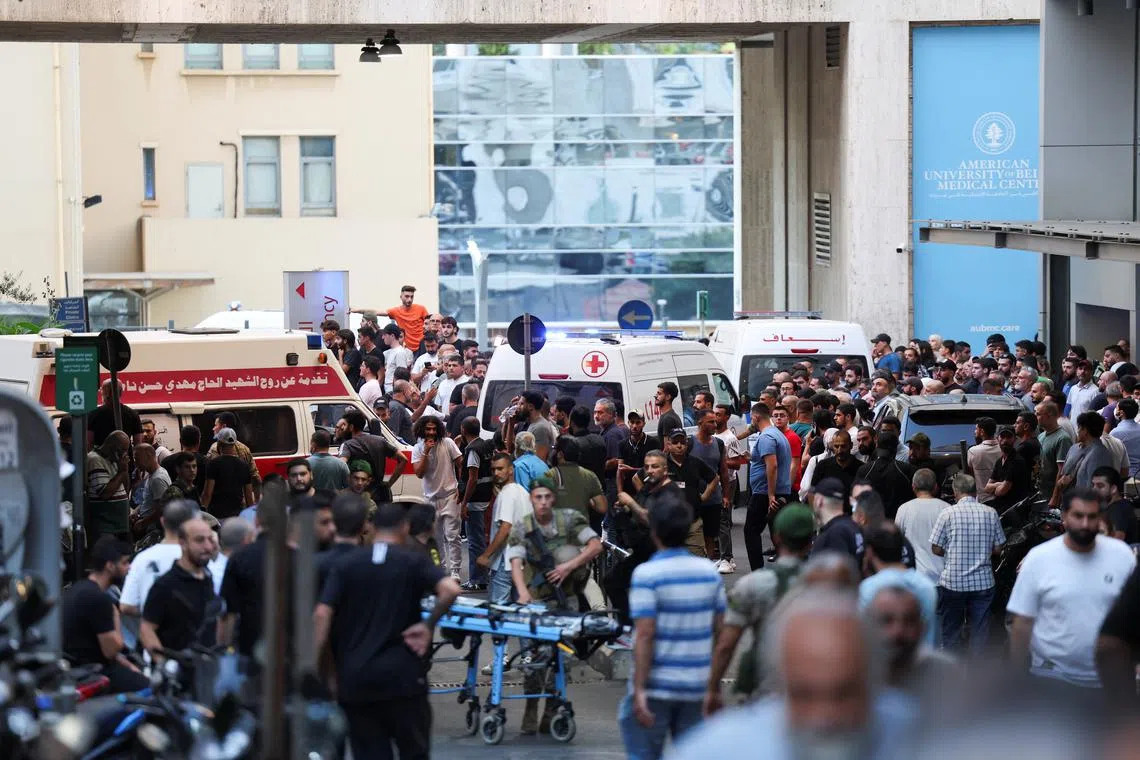What we know so far about the deadly pager blasts in Lebanon
Sign up now: Get ST's newsletters delivered to your inbox

Ambulances arriving at a hospital in Beirut on Sept 17, amid a wave of pager explosions across Lebanon.
PHOTO: REUTERS
BEIRUT - At least nine people were killed and nearly 3,000 wounded when pagers used by Hezbollah members – including fighters and medics – detonated simultaneously across Lebanon on Sept 17.
Here is what we know so far about the pager blasts.
When and where did the blasts take place?
The detonations started around 3.30pm in Lebanon in the country's south, the southern suburbs of Beirut known as Dahiyeh and the eastern Bekaa valley – all Hezbollah strongholds.
They lasted for around an hour, with Reuters witnesses and residents of Dahiyeh saying they could still hear explosions at 4.30pm.
According to security sources and footage reviewed by Reuters, some of the detonations took place after the pagers rang, causing the fighter to put their hands on them or bring them up to their faces to check the screen.
How big were the explosions?
The blasts were relatively contained, according to footage reviewed by Reuters. In two separate clips from the security footage of supermarkets, the blasts appeared to wound only the person wearing the pager or closest to it.
Footage shot at hospitals and shared on social media appeared to show individuals with injuries of varying degrees, including to the face, missing fingers and gaping wounds at the hip where the pager had most likely been worn.
The blasts did not appear to cause major damage or start any fires.
What type of pager exploded?
Israel’s Mossad spy agency planted a small amount of explosives inside 5,000 Taiwan-made pagers ordered by Lebanese group Hezbollah months before the Sept 17 detonations, a senior Lebanese security source and another source told Reuters.
The Lebanese source said the group had ordered pagers made by Taiwan-based Gold Apollo, which several sources say were brought into the country earlier in 2024.
The source identified the model of the pager, an AP924, via a photograph.
Images of destroyed pagers analysed by Reuters showed a format and stickers on the back that were consistent with pagers made by Gold Apollo, a Taiwan-based pager manufacturer.
Hezbollah did not reply to questions from Reuters on the make of the pagers.
Gold Apollo’s founder Hsu Ching-kuang said the company did not make the pagers used in the explosions in Lebanon. They were manufactured by a company in Europe that had the right to use the Taiwanese company’s brand.
Hezbollah fighters began using pagers in the belief that they would be able to evade Israeli tracking of their locations, two sources familiar with the group's operations told Reuters earlier in 2024.
Three security sources told Reuters that the pagers that detonated were the latest model brought in by Hezbollah in recent months.
What caused the pagers to explode?
Hezbollah said it was carrying out a "security and scientific investigation" into the causes of the blasts and said Israel would receive “its fair punishment”.
But others said that Israel might have infiltrated the supply chain for Hezbollah’s pagers.
The New York Times reported that Israel hid explosive material within a new batch of the pagers before they were imported to Lebanon, citing American and other officials briefed on the operation.
Several experts who spoke with Reuters said they doubted the battery alone would have been enough to cause the blasts.
Professor Paul Christensen, an expert in lithium-ion battery safety at Newcastle University, said the damage seemed inconsistent with past cases of such batteries failing.
"What we're talking about is a relatively small battery bursting into flames. We're not talking of a fatal explosion here... my intuition is telling me that it's highly unlikely," he said.
Prof Ofodike Ezekoye, a mechanical engineering expert from the University of Texas, said another reason to doubt that the explosions were caused by overheating batteries is that typically, only a fully charged battery can catch fire or explode.
“Below 50 per cent (charge)... it will generate gases and vapour, but no fires or explosions. It is highly unlikely that everyone whose pager failed had a fully charged battery,” he said.
Israeli intelligence forces have previously placed explosives in personal phones to target enemies, according to prior reporting in the book Rise And Kill First.
Hackers have also demonstrated the ability to inject malicious code into personal devices, causing them to overheat and explode in some instances.
What have the authorities said about the blasts?
Lebanon's Foreign Ministry called the explosions an "Israeli cyber attack", but did not provide details on how it had reached that conclusion.
Lebanese Information Minister Ziad Makary said the attack was an assault on Lebanon's sovereignty.
Israel's military declined to comment to Reuters questions on the pager blasts.
The US State Department said Washington was gathering information and was not involved.
The Pentagon said there was no change in US force posture in the Middle East in the wake of the incident.
What are the implications for the Israel-Hezbollah conflict?
Analysts see the threat of escalation between Israel and Hezbollah, which have exchanged cross-border fire since the start of the Israel-Hamas war in Gaza in October 2023.
But experts are more sceptical, for now, about the potential for triggering an imminent all-out Israel-Hezbollah war, which the US has sought to prevent and which it believes neither side wants.
Mr Matthew Levitt, former deputy director of the US Treasury’s intelligence office and author of a book on Hezbollah, said the pager explosions could disrupt its operations for some time.
Mr Jonathan Panikoff, the US government’s former deputy national intelligence officer on the Middle East, said Hezbollah might downplay its “biggest counter-intelligence failure in decades”, but rising tensions could eventually erupt into full-scale war if diplomacy continues to fall short. REUTERS


